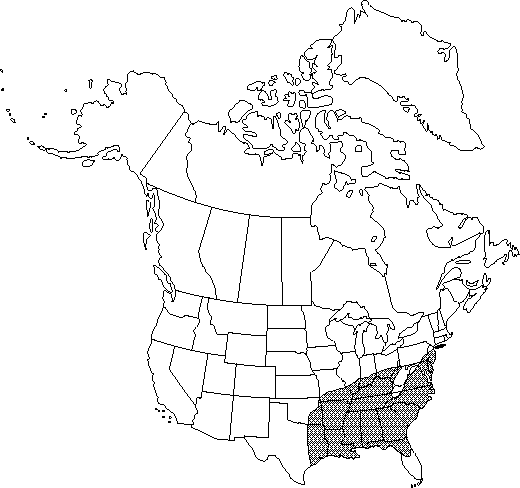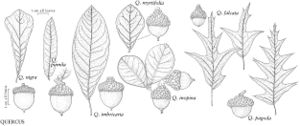Difference between revisions of "Quercus falcata"
Hist. Chênes Amér., no. 16, plate 28. 1801.
FNA>Volume Importer |
imported>Volume Importer |
||
| (7 intermediate revisions by 2 users not shown) | |||
| Line 9: | Line 9: | ||
|common_names=Southern red oak;Spanish oak;chêne rouge | |common_names=Southern red oak;Spanish oak;chêne rouge | ||
|special_status={{Treatment/ID/Special_status | |special_status={{Treatment/ID/Special_status | ||
| + | |code=W1 | ||
| + | |label= | ||
| + | }}{{Treatment/ID/Special_status | ||
|code=E | |code=E | ||
|label=Endemic | |label=Endemic | ||
}}{{Treatment/ID/Special_status | }}{{Treatment/ID/Special_status | ||
|code=F | |code=F | ||
| − | |label= | + | |label=Illustrated |
| − | |||
| − | |||
| − | |||
}} | }} | ||
|basionyms= | |basionyms= | ||
|synonyms={{Treatment/ID/Synonym | |synonyms={{Treatment/ID/Synonym | ||
| − | |name= | + | |name=Quercus digitata |
|authority=Sudworth | |authority=Sudworth | ||
| − | }}{{Treatment/ID/Synonym | + | |rank=species |
| − | |name= | + | }} {{Treatment/ID/Synonym |
| + | |name=Quercus falcata var. triloba | ||
|authority=(Michaux) Nuttall | |authority=(Michaux) Nuttall | ||
| + | |rank=variety | ||
}} | }} | ||
|hierarchy=Fagaceae;Quercus;Quercus sect. Lobatae;Quercus falcata | |hierarchy=Fagaceae;Quercus;Quercus sect. Lobatae;Quercus falcata | ||
| Line 33: | Line 35: | ||
}}<!-- | }}<!-- | ||
| − | --><span class="statement" id="st- | + | --><span class="statement" id="st-undefined" data-properties=""><b>Trees,</b> deciduous, to 30 m. <b>Bark</b> dark brown to black, narrowly fissured with scaly ridges, inner bark orange. <b>Twigs</b> reddish brown, (1-)1.5-3.5(-4.5) mm diam., pubescent. <b>Terminal</b> buds light reddish brown, ovoid, 4-8 mm, puberulent throughout. <b>Leaves</b>: petiole 20-60 mm, glabrous to sparsely pubescent. <b>Leaf</b> blade ovate to elliptic or obovate, 100-300 × 60-160 mm, base rounded or U-shaped, margins with 3-7 deep lobes and 6-20 awns, terminal lobe often long-acuminate, much longer than lateral lobes, apex acute; surfaces abaxially sparsely to uniformly tawny-pubescent, adaxially glossy and glabrous or puberulent along midrib, secondary veins raised on both surfaces. <b>Acorns</b> biennial; cup saucer-shaped to cup-shaped, 3-7 mm high × 9-18 mm wide, covering 1/3-1/2 nut, outer surface puberulent, inner surface pubescent, scale tips tightly appressed, acute; nut subglobose, 9-16 × 8-15 mm, often striate, puberulent, scar diam. 5-10 mm.</span><!-- |
-->{{Treatment/Body | -->{{Treatment/Body | ||
| Line 40: | Line 42: | ||
|elevation=0-800 m | |elevation=0-800 m | ||
|distribution=Ala.;Ark.;Del.;D.C.;Fla.;Ga.;Ill.;Ind.;Ky.;La.;Md.;Miss.;Mo.;N.J.;N.Y.;N.C.;Ohio;Okla.;Pa.;S.C.;Tenn.;Tex.;Va.;W.Va. | |distribution=Ala.;Ark.;Del.;D.C.;Fla.;Ga.;Ill.;Ind.;Ky.;La.;Md.;Miss.;Mo.;N.J.;N.Y.;N.C.;Ohio;Okla.;Pa.;S.C.;Tenn.;Tex.;Va.;W.Va. | ||
| − | |discussion=<p>Native Americans used Quercus falcata in various ways to treat indigestion, chronic dysentery, sores, chapped skin, chills and fevers, lost voice, asthma, milky urine, and as an antiseptic, a tonic, and an emetic (D. E. Moerman 1986).</p><!-- | + | |discussion=<p>Native Americans used <i>Quercus falcata</i> in various ways to treat indigestion, chronic dysentery, sores, chapped skin, chills and fevers, lost voice, asthma, milky urine, and as an antiseptic, a tonic, and an emetic (D. E. Moerman 1986).</p><!-- |
| − | --><p>Quercus falcata reportedly hybridizes with Q. ilicifolia (= Q. ×caesariensis Moldenke), Q. imbricaria, Q. incana, Q. laevis, Q. laurifolia (= Q. ×beaumontiana Sargent), and Q. marilandica (E. J. Palmer 1948); with Q. nigra, and Q. pagoda (S. A. Ware 1967; R. J. Jensen 1989); and with Q. phellos, Q. shumardii, Q. hemisphaerica, and Q. velutina.</p> | + | --><p><i>Quercus falcata</i> reportedly hybridizes with <i>Q. ilicifolia</i> (= Q. ×caesariensis Moldenke), <i>Q. imbricaria</i>, <i>Q. incana</i>, <i>Q. laevis</i>, <i>Q. laurifolia</i> (= Q. ×beaumontiana Sargent), and <i>Q. marilandica</i> (E. J. Palmer 1948); with <i>Q. nigra</i>, and <i>Q. pagoda</i> (S. A. Ware 1967; R. J. Jensen 1989); and with <i>Q. phellos</i>, <i>Q. shumardii</i>, <i>Q. hemisphaerica</i>, and <i>Q. velutina</i>.</p> |
|tables= | |tables= | ||
|references= | |references= | ||
| Line 50: | Line 52: | ||
-->{{#Taxon: | -->{{#Taxon: | ||
name=Quercus falcata | name=Quercus falcata | ||
| − | |||
|authority=Michaux | |authority=Michaux | ||
|rank=species | |rank=species | ||
|parent rank=section | |parent rank=section | ||
| − | |synonyms= | + | |synonyms=Quercus digitata;Quercus falcata var. triloba |
|basionyms= | |basionyms= | ||
|family=Fagaceae | |family=Fagaceae | ||
| Line 64: | Line 65: | ||
|publication title=Hist. Chênes Amér., no. | |publication title=Hist. Chênes Amér., no. | ||
|publication year=1801 | |publication year=1801 | ||
| − | |special status=Endemic; | + | |special status=W1;Endemic;Illustrated |
| − | |source xml=https:// | + | |source xml=https://bitbucket.org/aafc-mbb/fna-data-curation/src/2e0870ddd59836b60bcf96646a41e87ea5a5943a/coarse_grained_fna_xml/V3/V3_452.xml |
|genus=Quercus | |genus=Quercus | ||
|section=Quercus sect. Lobatae | |section=Quercus sect. Lobatae | ||
|species=Quercus falcata | |species=Quercus falcata | ||
| − | |||
| − | |||
| − | |||
| − | |||
| − | |||
| − | |||
| − | |||
| − | |||
| − | |||
| − | |||
| − | |||
| − | |||
| − | |||
| − | |||
| − | |||
| − | |||
| − | |||
| − | |||
| − | |||
| − | |||
| − | |||
| − | |||
| − | |||
| − | |||
| − | |||
| − | |||
| − | |||
| − | |||
| − | |||
| − | |||
| − | |||
| − | |||
| − | |||
| − | |||
| − | |||
| − | |||
| − | |||
| − | |||
| − | |||
| − | |||
| − | |||
| − | |||
}}<!-- | }}<!-- | ||
-->[[Category:Treatment]][[Category:Quercus sect. Lobatae]] | -->[[Category:Treatment]][[Category:Quercus sect. Lobatae]] | ||
Latest revision as of 22:48, 5 November 2020
Trees, deciduous, to 30 m. Bark dark brown to black, narrowly fissured with scaly ridges, inner bark orange. Twigs reddish brown, (1-)1.5-3.5(-4.5) mm diam., pubescent. Terminal buds light reddish brown, ovoid, 4-8 mm, puberulent throughout. Leaves: petiole 20-60 mm, glabrous to sparsely pubescent. Leaf blade ovate to elliptic or obovate, 100-300 × 60-160 mm, base rounded or U-shaped, margins with 3-7 deep lobes and 6-20 awns, terminal lobe often long-acuminate, much longer than lateral lobes, apex acute; surfaces abaxially sparsely to uniformly tawny-pubescent, adaxially glossy and glabrous or puberulent along midrib, secondary veins raised on both surfaces. Acorns biennial; cup saucer-shaped to cup-shaped, 3-7 mm high × 9-18 mm wide, covering 1/3-1/2 nut, outer surface puberulent, inner surface pubescent, scale tips tightly appressed, acute; nut subglobose, 9-16 × 8-15 mm, often striate, puberulent, scar diam. 5-10 mm.
Phenology: Flowering spring.
Habitat: Dry or sandy upland sites
Elevation: 0-800 m
Distribution

Ala., Ark., Del., D.C., Fla., Ga., Ill., Ind., Ky., La., Md., Miss., Mo., N.J., N.Y., N.C., Ohio, Okla., Pa., S.C., Tenn., Tex., Va., W.Va.
Discussion
Native Americans used Quercus falcata in various ways to treat indigestion, chronic dysentery, sores, chapped skin, chills and fevers, lost voice, asthma, milky urine, and as an antiseptic, a tonic, and an emetic (D. E. Moerman 1986).
Quercus falcata reportedly hybridizes with Q. ilicifolia (= Q. ×caesariensis Moldenke), Q. imbricaria, Q. incana, Q. laevis, Q. laurifolia (= Q. ×beaumontiana Sargent), and Q. marilandica (E. J. Palmer 1948); with Q. nigra, and Q. pagoda (S. A. Ware 1967; R. J. Jensen 1989); and with Q. phellos, Q. shumardii, Q. hemisphaerica, and Q. velutina.
Selected References
None.
